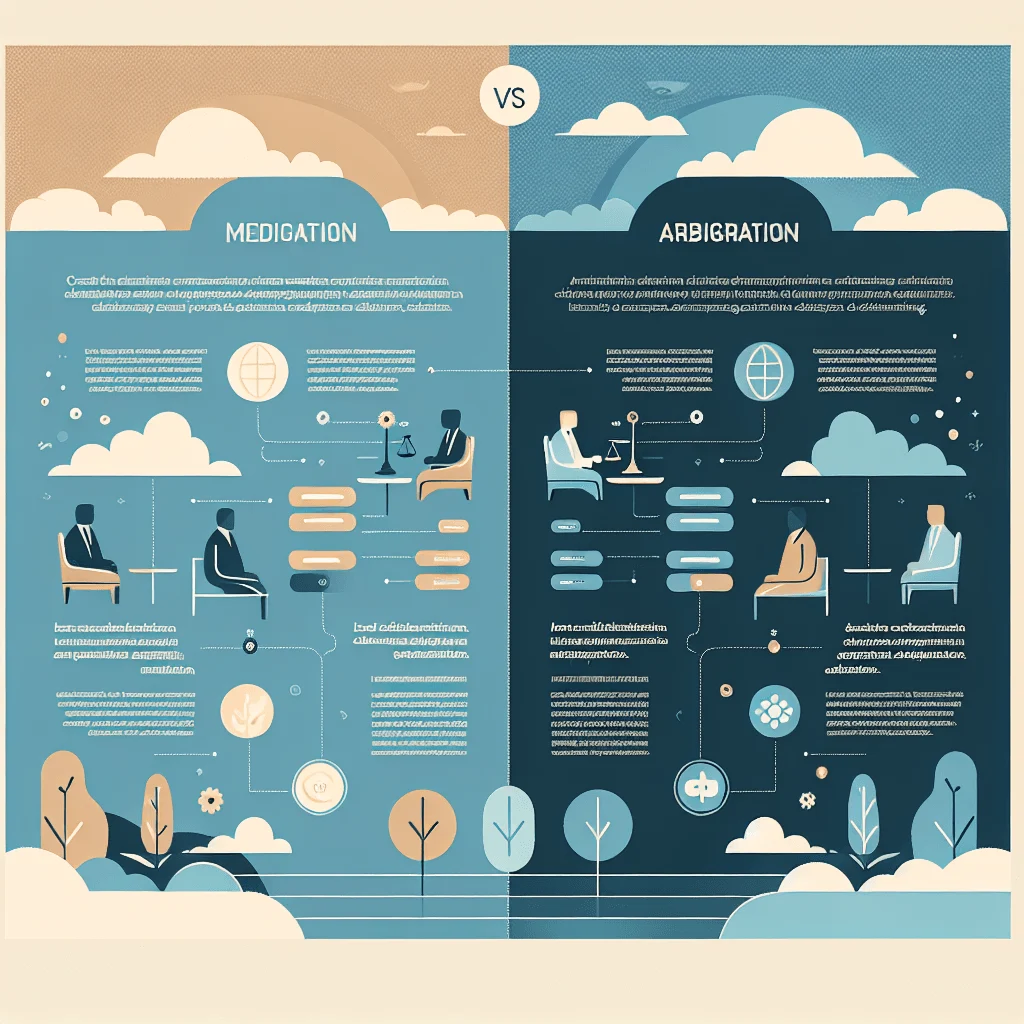Understanding the Difference Between Mediation and Arbitration
Conflicts are a normal part of life, whether in business, family, or everyday relationships. But when conversations break down and issues escalate, alternative dispute resolution (ADR) methods like mediation and arbitration can help. The difference between mediation and arbitration is something many people confuse—yet understanding it can be key in choosing the right method for your situation.
In this article, we’ll delve into their distinctions in structure, outcomes, and usage, so you can make an informed decision that serves your mental peace and integrity. If you’re looking to cultivate more inner calm in your decision-making processes, consider exploring our Everyday Calm: A Beginner’s Guide to Daily Meditation.
Definitions: Mediation vs. Arbitration
What is Mediation?
Mediation is a non-binding process in which a neutral third party, known as the mediator, assists two or more parties in reaching a voluntary agreement. The mediator doesn’t make decisions for the participants—they merely guide them towards mutual understanding and compromise. It’s a collaborative process rooted in communication and flexibility.
What is Arbitration?
Arbitration, on the other hand, is more formal. It mimics a courtroom setting where an arbitrator—or sometimes a panel—listens to the arguments and evidence, then delivers a decision that is typically binding. This outcome is enforceable, much like a court ruling, which makes arbitration more rigid than mediation.
Key Differences Between Mediation and Arbitration
1. Structure and Formality
Mediation is informal and highly adaptable. Sessions can be held in person or virtually, and there’s room for pause, emotions, and brainstorming. In contrast, arbitration has predefined rules. There’s a clear structure: presentation of evidence, closing statements, and eventually, a decision handed down by the arbitrator.
2. Control Over the Outcome
In mediation, the parties maintain control over the result. Because they craft the agreement themselves, any resolution reflects their needs. Arbitration removes that control—once you’ve presented your case, the arbitrator decides your fate. This is a major difference between mediation and arbitration.
3. Confidentiality
One significant benefit of both methods is confidentiality. However, mediation often remains more strictly private, as there are no transcripts or formal records. Arbitration proceedings may be documented, especially in corporate or legal contexts, even if they remain outside public court records.

4. Time and Cost
Generally speaking, mediation is quicker and more cost-effective than arbitration. Because it’s less formal, it avoids attorney fees, filing costs, and procedural delays. Arbitration can be lengthy, especially if appeals or multi-day hearings are involved.
5. Emotional and Relational Impact
A lesser-discussed but important difference between mediation and arbitration is the emotional impact. Mediation fosters a cooperative atmosphere, which helps preserve relationships—particularly important in family disputes or workplace conflicts. Arbitration, though less adversarial than court, still positions parties as opponents, which can increase tension.
When to Choose Mediation
If your priority is maintaining relationships, encouraging communication, or arriving at a creative, win-win solution, mediation may be the better route. It’s frequently used in:
- Family matters (divorce, child custody)
- Workplace conflicts
- Community disputes
- Business transactions between long-term partners
Mediation also supports emotional wellbeing, especially for those prioritizing inner harmony. In our article Mental Health & Wellbeing, we explore other holistic approaches to conflict and stress resolution techniques.
When Arbitration Makes Sense
Arbitration is often helpful when parties want a definitive legal decision, but prefer it outside the costly court system. It’s suitable for:
- Employment disputes where a binding resolution is necessary
- Commercial contract conflicts
- Construction or property disagreements
- International business issues
Because arbitrators often have legal or industry-specific knowledge, this method offers expert judgments in technical fields. In some cases, agreements might even have clauses that mandate arbitration, especially in commercial contracts.
The Role of Emotional Intelligence in Conflict Resolution
Another factor that intersects with both mediation and arbitration is emotional intelligence. While not explicitly included in either process, being aware of one’s own feelings and those of others aids progress. Especially in mediation, where collaborative discussions take center stage. Developing emotional intelligence can lower conflict and contribute to personal balance. You might find the insights in our category Personal Growth valuable in this regard.

Legal Enforceability and Appeal
One final but significant distinction lies in enforceability. Arbitration decisions, especially binding ones, are final and legally enforceable. It’s rare (and difficult) to appeal arbitration, which can streamline closure but also limit recourse. Mediation agreements, while crafted together, must often be turned into legal contract forms to be enforceable. This is an essential consideration when choosing a path forward.
Common Myths and Misconceptions
There’s a misconception that mediation isn’t “serious” or appropriate for complex cases. In fact, trained mediators can aid negotiations on everything from business mergers to family diplomacy. Similarly, many fear arbitration is just a private court—not true either, as it’s often cheaper and faster than litigation. Demystifying the difference between mediation and arbitration helps clarify which suits your current need best.
Final Thoughts: Choose What Nurtures Resolution and Peace
Whether you choose mediation or arbitration depends largely on your goals—emotional, relational, legal, and financial. For many, it’s not about winning a battle but resolving an issue and moving on with life more grounded and empowered. Understanding each method’s nuances empowers you to do just that. For those also interested in manifesting a vision of peace and clarity in their lives, check out our essential resource: Manifest Your Dreams: A Practical Guide to the Law of Attraction.
If you enjoyed this article, you might also like Mindfulness & Meditation resources as a way to cultivate clarity before or after engaging in dispute resolution practices.

